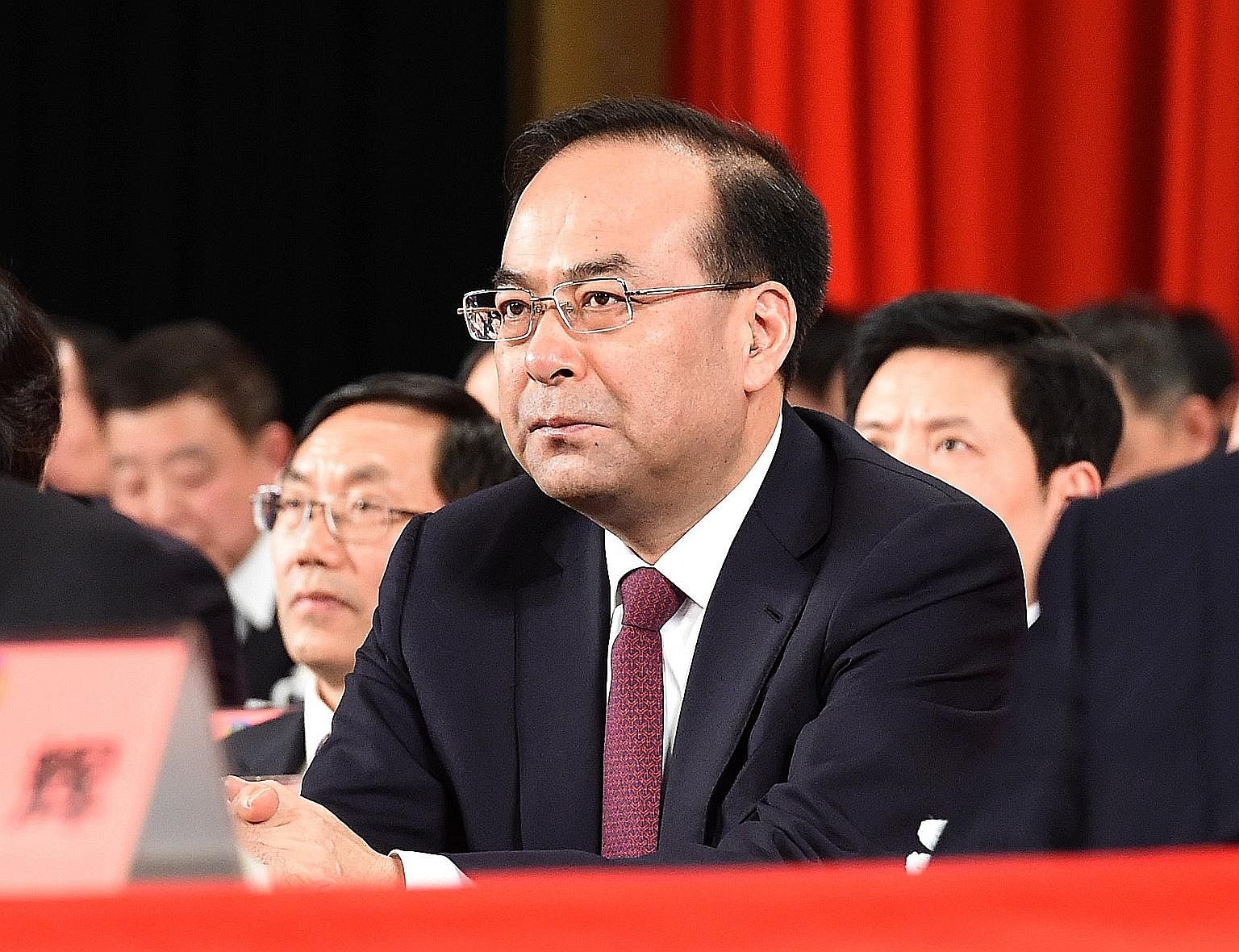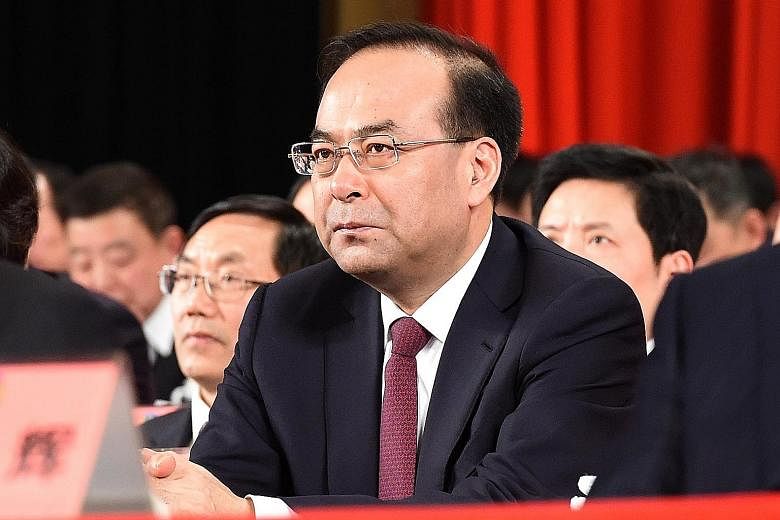Chongqing party chief and political high-flyer Sun Zhengcai's downfall is a sign that the norms of leadership succession that came about during the Deng Xiaoping era and after are being changed.
It is also an indication that it is yet to be decided who will succeed the leadership led by President Xi Jinping, as the Chinese Communist Party (CCP) gears up for its 19th national congress due to take place this autumn.
Mr Sun's fall from grace also reflects the resolve of Mr Xi's administration in carrying out the anti-corruption drive, say some analysts, although not everyone agrees. Some believe he was removed as Chongqing party chief as he did not show enough loyalty to Mr Xi.
The Global Times tabloid, owned by the party mouthpiece People's Daily, said in an op-ed yesterday that Mr Sun "has failed to rein in his power and control his swelling selfish desires".
Mr Sun was suddenly removed from his post as party chief of Chongqing on July 15 and replaced by Mr Chen Min'er, the Guizhou province party boss and a trusted protege of Mr Xi's.
Then on Monday, it was announced that Mr Sun, 53, also a member of the powerful 25-member Politburo, was being investigated for "serious violation" of party discipline.
While it is unclear what mistakes Mr Sun has committed, said Professor Zheng Yongnian, director of the East Asian Institute at the National University of Singapore, Chongqing city has been performing below expectations in the past five years under Mr Sun's leadership.

For example, there has been no continuation of the anti-corruption campaign following the ructions of 2012 in the city with a corruption scandal involving then party chief Bo Xilai, a potential rival of Mr Xi. A February report by the party's anti-graft watchdog said the "evil legacy" of Bo had not been completely removed from the city.
When Mr Sun and Guangdong party boss Hu Chunhua, 54, were inducted into the Politburo in 2012, they were seen as front runners to succeed Mr Xi and his contemporaries.
-
Rise and fall
BEIJING • Mr Sun Zhengcai, a Politburo member once seen as a contender for a top leadership post, was the Communist Party chief in the major city of Chongqing before being ousted some 10 days ago.
At 53, Mr Sun is the youngest member of the elite 25-person Politburo.
He is the first serving member of the Politburo to be placed under investigation since Bo Xilai, also a former Chongqing party chief who was jailed for life in 2013 in the wake of President Xi Jinping's anti-corruption campaign.
Mr Sun was sent to Chongqing in 2012, when the city was shaken by the corruption, murder and torture exposed after Bo fell from power.
Before being named Chongqing's party chief, Mr Sun had served as China's agriculture minister and also the party secretary of Jilin province.
AGENCE FRANCE-PRESSE, NYTIMES, REUTERS
However, by removing Mr Sun, Mr Xi "wants to send a signal to party members that there is no fixed pass to the top", said Prof Zheng. "You have to work hard, you can't just wait there, you have to perform."
In the past, anointed successors just had to keep their head down, toe the line and not make mistakes so as to move up, but this is not enough any more. Prof Zheng expects that Mr Xi will build a new succession system.
Another possible break from the past is that instead of the normal two terms in office, Mr Xi might go for a third term as leader of the CCP. This is why he is in no hurry to name a successor at the upcoming party congress, analysts have said.
For this to happen, said Professor Huang Jing of the Lee Kuan Yew School of Public Policy, Mr Xi will have to reform the state and party leadership structure put in place by late patriarch Deng Xiaoping when he made Mr Jiang Zemin the president, secretary-general of the CCP and chairman of the Central Military Commission.
This is because the state president's two-term limit was written into the Constitution during Deng's time as a way of preventing anyone from clinging on to power. But there is no written term limit for the general secretary of the party, only an unwritten norm of two terms.
So while Mr Xi can stay on as party chief for a third term in 2022, he cannot remain as president.
Prof Huang thinks it would be a good thing to break up the norm of having the top leader wear all three hats of party, state and military leader because the current arrangement is dangerous as it gives too much power to one person.
Having Mr Xi serve a third term as party leader might also not be a bad thing, he adds, as it means policy consistency and therefore stability.
Right now, with the other party leaders chosen for him in 2012 by his predecessors, he may not always be able to get his way.
If he can stay on for another 10 years with his own people in place, he will be able to have his policies carried out for that duration and also continue with his important anti-corruption campaign.
What Mr Sun's fall also shows is that the successors to the current leadership are not decided yet, analysts have said.
Many expect that several young leaders, mainly Mr Xi's proteges, will be promoted to the Politburo where they will be tested and trained for higher office. As many as 11 incumbents are expected to step down as they have reached the unwritten age limit of 68.
And while five members of the apex Politburo Standing Committee (PSC) are expected to step down because they have reached the age limit, there is speculation that there could be a break from this norm. Some pundits are saying that anti-graft czar Wang Qishan, who is 69, may stay on the PSC.
With Mr Sun removed, there is now some doubt whether Mr Hu will be promoted to the PSC and, even if he is, whether he will be in line to succeed Mr Xi.
It looks like another norm of succession - of having a leader's predecessor name his successor, thus Deng naming Mr Jiang's successor Hu Jintao, Mr Jiang naming Mr Hu's successor and Mr Hu naming Mr Xi's successor - may also be broken.
Change is in the air this coming party congress, and it will not be just a leadership reshuffle.


